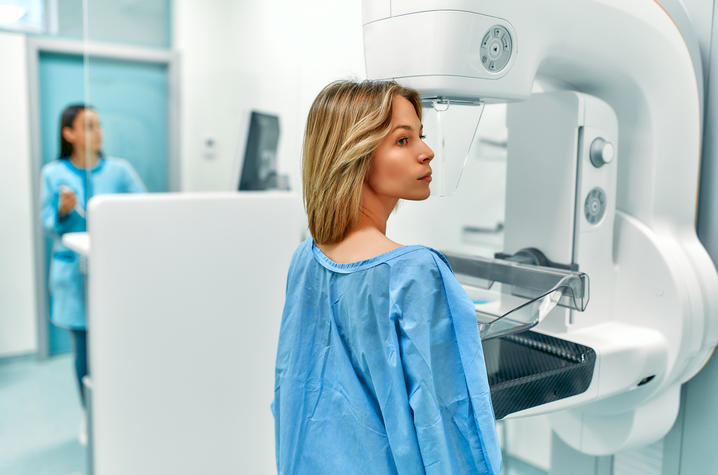Assess your breast cancer risk by age 30; yearly mammograms begin at 40

The University of Kentucky Public Relations and Strategic Communications Office provides a weekly health column available for use and reprint by news media. This week's column is by Aurela Clark, M.D., and Margaret Szabunio, M.D., radiologists with the University of Kentucky Markey Cancer Center.
LEXINGTON, Ky. (Oct. 17, 2022) — As we gradually approach a sense of new norm, it is good to see that patients are returning to get their mammograms in higher numbers than pre-pandemic. But unfortunately, because many women missed one or two years of screening, breast imagers and clinicians across the nation are encountering patients with more advanced stages of breast cancer. The pandemic has further highlighted the importance of NOT skipping the yearly breast screening mammogram.
What are the current recommendations on screening mammograms?
The American College of Radiology (ACR) and the Society of Breast Imaging (SBI) recommends all women of average lifetime risk for breast cancer begin getting annual mammograms at age 40. Since most patients diagnosed with breast cancer have no specific risk factors, annual screening is important for all women.
What about women with higher-than-average risk factors?
The ACR/SBI recommend that by age 30, all women should talk to their health care providers about determining their risk of breast cancer, especially Black women and those of Ashkenazi Jewish descent.
You might be at increased risk if:
- you have family members with breast cancer;
- you have already had breast cancer;
- you carry certain genetic mutations, including BRCA1 and BRCA2 mutations;
- someone in your family is a genetic mutation carrier and you remain untested yourself;
- you have been previously treated with radiation to your chest for cancer;
- you have had certain “high-risk” results on breast biopsies such as atypias or pre-cancerous lesions; and/or
- you have dense breast tissue on mammography.
Lifestyle risk factors that correlate strongly with breast cancer include obesity, alcohol consumption, smoking and diets that are high in saturated fats.
Higher-risk women should start getting their annual mammograms earlier and may benefit from supplemental screening including breast MRI.
If you have a strong family history of breast cancer, talk to your doctor about genetic testing. Knowing your risk will allow for a more personalized screening schedule.
Advice to patients about getting their mammograms
- Get your mammogram yearly at the same breast imaging center, starting at age 40 for average risk women.
- If called back for further evaluation after your screening mammogram, don’t panic. Most call backs require no intervention and 80% of biopsies are benign. However, it is still very important to keep all your follow-up appointments, as a small percentage of the call backs result in cancer detection, which has the best outcomes when found in early stages.
As the state’s flagship, land-grant institution, the University of Kentucky exists to advance the Commonwealth. We do that by preparing the next generation of leaders — placing students at the heart of everything we do — and transforming the lives of Kentuckians through education, research and creative work, service and health care. We pride ourselves on being a catalyst for breakthroughs and a force for healing, a place where ingenuity unfolds. It's all made possible by our people — visionaries, disruptors and pioneers — who make up 200 academic programs, a $476.5 million research and development enterprise and a world-class medical center, all on one campus.




